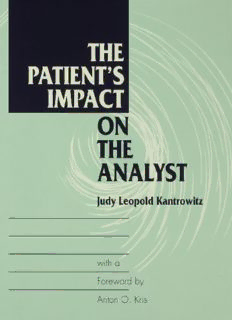
The Patient’s Impact on the Analyst PDF
Preview The Patient’s Impact on the Analyst
The Patient's Impact On the Analyst ForPaul The Patient's Impact On the Analyst Judy Leopold Kantrowitz With a Foreword by o. Anton Kris THE ANALYTIC PRESS 1996 Hillsdale, N) London Copyright 1996 by TheAnalyticPress,Inc. All rightsreserved. No partofthisbook maybereproduced inany form:by photostat, microform,retrieval system,oranyothermeans, withoutthepriorwritten permissionofthepublisher. Published byTheAnalyticPress, Inc. Editorial Offices:101WestStreet,Hillsdale,NJ 07642 LibraryofCongressCataloging-in-Publication Data Kantrowitz,JudyLeopold, 1938- The patient's impact on theanalystIJudyLeopold Kantrowitzwith a Foreword byAnton 0. Kris. p. cm. Includes bibliographical referencesand index. ISBN0-88163-211-2 1.Psychotherapistandpatient. 2.Psychoanalysts-Psychology. 3.Self-analysis(Psychoanalysis).4.Countertransference(Psychology) 5.Change(Psychology) I.Title. [DNLM; 1.Professional-PatientRelations. 2.Psychotherapy. 3.SelfAssessment(Psychology) 4.Transference(Psychology) WM 62 K161 1996] RC480.8.K36 1996 616.89'14023-dc20 DNLMlDLC for Library ofCongress 96-38505 ClP Printed inthe United StatesofAmerica 10 9 8 7 6 5 4 3 2 1 The Patient's Impact On the Analyst Acknowledgments My gratitude and thanks are owed to so many people who in various ways have made this book possible that Iwish toapologizein advance forany Imay neglect tothankspecifically. Iwanttobegin byexpressingmyappreciationtotheanalystswhopar ticipated inthisstudy.Withouttheirgenerosityinsharingtheir thoughts andexperiences,thebooknever wouldhavebeenwritten.Iamespecially gratefultothe26analystswho volunteered tobeinterviewed.Their can dorand willingness toshare their personalandsometimesvery painful experiencesdeepenedmyown appreciationoftheemotionalimpactthat cancome from ourwork. Their exampleshelpedmetoexpandthe ideas that IhadwhenIbeganthisproject.ThebookthatIhavewrittenhasbeen significantlyshapedby theircontributions. IamgratefultotheBostonPsychoanalyticSocietyandInstituteforgiv ingmeasmall researchgranttocoverthesecretarial,statistical,andother miscellaneouscostsofthisproject.MyspecialthanksgotoDiane Nugent fortheadministrationofthisfund.Iwish tothankKarenSmolensforher secretarialhelp and Frederick Roccoforperformingthe statistical analy ses and patiently guiding me through their interpretations.LeeBrauer, MurrayCohen,TheodoreCross, and Howard Schumanwere each gen erous in taking time to discuss various methodological issues in this work.AnneMenashifound countlessreferences formeandoccasionally unearthedsome relevantarticleswithwhich Iwasunfamiliar. WarrenPolandwas the firsttosuggestandencourageme to turn this project into abook. AndrewMorrisonintroduced me toPaul Stepansky and told me of his very positive experienceworking withThe Analytic Press.RobertGardnerprovidedasimilarendorsement.Myappreciation tothemisgreat, forworkingwith PaulStepanskyhasbeen astimulating andgratifyingexperience. Fromtheoutset,PaulStepanskyhasbeensupportiveandencouraging. Hewas willingtoreaddraftsofthisbookeveninitsmost primitiveform and offered clear, constructive suggestions that assisted me in finding directionin continuingmy work. He has a fine ear for languageandan appreciationofthe clinicalsituationthatmadeclearheknew whatIwas tryingtosay andwhenIwasor was notsayingitwell.lowethe titleof the bookto his suggestion. He introduced me toauthors Ihad not read and broadenedmy appreciationofcurrentpsychoanalyticthinking.His availabilityand responsivitywere consistentthroughout. As a first-time author of a book, Ihave no basis for comparison,but Icannot imagine that any authorcouldhave abetterexperience. Hisstaff has also been a pleasure to workwith. Iespecially wish toexpress appreciation toJohn o V 0 o vi Acknowledgments 0 Kerr for reading and offering suggestions on specific chapters and to Eleanor Starke (Lenni) Kobrin, who supervised the production of this book. Manyofmy friendsandcolleagueshavegenerouslygiventime and,in some instances, editorial assistance to this work. Natalie Bluestone, Frances Givelber, William Grossman, Dan Jacobs, Anton Kris, Austin Silber, Anna Wolff, and Judith Yanof have all read and offered helpful suggestions for various parts and drafts of this book. I am especially grateful to Anton Kris for readingthe entirebookin its nearlyfinal form andforcontributingitsvaluableforeword. My gratitude is, of course, not limited to those who formally con tributed to the actual construction of the book. lowe an inexpressibly great debt to my patients. If I had not been aware of how much I had learnedfrom them,Imightneverhaveembarkedon this study.Iam also grateful to my teachers, supervisors, analyst, and therapists for all they have taught me and for enabling me to go on and continue to learn for myself. My friends, someofwhom read thisworkin progressandsome ofwhomdidnot, havealso contributedtowhatIhavecometoknowand continue to learn. Like the analysts interviewed in thisbook, Ifind ana lyticworkand itsvicissitudesacontinualsourceofstimulationandcon sidermyselffortunate to havefriends withwhom mutualsharing isnot onlypossiblebutwelcomed. My family have been a continuing source of inspiration, support, and encouragement. My parents always believed in me and supported my wishtogrowand learnevenwhenthedirectionswereinwaysthey them selveshadnotknown.My father's capacityforempathyremainsa model formy besttherapeuticself.Hisself-disciplineanddeterminationtoover come adversity have providedan importantsourceof strength forme to emulate.IwishI had knownof the shamehe feltaboutsomeofhisearly history. This bookmay be in partan attempt to do for otherswhatIwas unabletodoforhim.Mymother'sever-euriousandimaginativemind,her opennessto new ideas,herwillingness to try newcreativemeansofself expression well into her mid 80s, as well as her capacity to grow and changeinrelationships,havealsoprovidedinspirationforwhatispossible. My gratitudeto mychildrenisenormous. Ihavelearnedfromeachof them in a different way. Each has made me feelsupported in mywork andspecificallyencouragedinwritingthisbook. But, most of all, I wish to express my indebtedness to my husband, Paul. Without his supportandencouragement, Icouldnothave under taken this project. He has helped meconcretelyby listening to and dis cussingmy ideasandby readingandcritiquingmy writing.Iwillalways be grateful for his patience and understandingabout the timeandemo tional energy this projecttook. loweapologies to myfriendsandfamily for the times Ihave notbeen as available as Iwould have wished to be duringthecourseofworkingon thisbook,buttononeasmuchastohim. His devotion and emotional support provided the sustenance for me to do thiswork. Contents Foreword-AntonO. Kris ix Introduction xi PartI PROLOGUE 1. The Project 3 PartII WAYSOFKNOWING 2. FormsofSelf-Exploration:DifferentAnalysts, DifferentModesofExploration 23 3. Triggersfor Self-Knowledge: How Analysts Recognizean AspectofThemselvesRequiring FurtherSelf-Reflection 51 4. Pathwaysto Self-Knowledge:PrivateReflections, SharedCommunications,and Workwith Patients 77 o vii 0 oviii 0 Contents PartIII CHANGESIN THE ANALYST 5. SimilarityofAffect,Conflict, Defense,or Situation 107 6. Admiration for Qualitiesor CharacteristicsofPatients 131 7. Patients' Interpretationsof the Analyst 149 8. CountertransferenceResponsesas Stimuli for Self-Reflection 165 9. TheTherapeuticProcessfor the Analyst 185 10. TherapeuticActionof Psychoanalysis: Explorationof Its ImpactontheAnalyst 207 11. TheDarkerSide:ThePotential NegativeImpactof PatientsonTheirAnalysts 221 PART IV EPILOGUE 12. ConcludingThoughts 233 References 245 AppendixA 255 Appendix B 261 AppendixC 277 Index 278
Description: